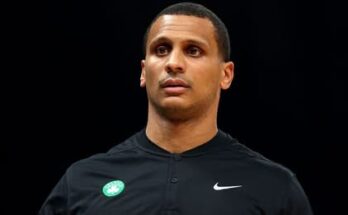Tennessee Vols Defensive Back Boo Carter Officially Spotted with Team After Decision Was Made on His Future in Knoxville
Boo Carter is back where many believe he belongs—wearing Tennessee orange and white, standing among his teammates on the practice field in Knoxville. After months of swirling rumors, heated online debates, and some brief but meaningful absence from team activities, the sophomore defensive back was officially spotted with the team during summer camp, ending a tense period of speculation about his status with the Volunteers. While it may not yet signal a full return to game action, the visual confirmation and word from Tennessee head coach Josh Heupel made it clear: Boo Carter is still part of the team. That simple fact comes with significant weight in a program with high expectations and a defensive unit needing leaders and playmakers.
Carter’s offseason journey has been anything but smooth. After a standout freshman season in which he earned SEC All-Freshman honors, started six games, and became one of the most electric punt returners in the conference, many expected him to step into an even larger role in 2025. He had shown flashes of brilliance, registering nearly 40 tackles, a sack, an interception, and multiple highlight-reel moments as a return specialist. A versatile athlete, Carter also expressed his desire to contribute on offense, a position he excelled at in high school. With Tennessee losing key weapons on both sides of the ball during the offseason, the timing seemed right for Carter to become a central figure in the Vols’ game plan.
However, things quickly grew complicated. Whispers began to surface that Carter was unhappy with his role, particularly with the limited offensive opportunities he had been given. He had spent parts of spring camp taking reps at wide receiver, drawing attention and excitement from coaches and fans alike. But by early summer, reports emerged that he had missed a series of team workouts. Soon after, questions began flying about whether Carter would stay in Knoxville or seek new opportunities elsewhere, perhaps through the transfer portal. The situation raised alarm bells, especially given the growing trend in college football of highly touted players leveraging NIL deals and positional flexibility to negotiate their roles within programs or explore new options entirely.
For Tennessee fans, the possibility of losing Carter felt like more than just a roster hit—it was a cultural loss. Boo Carter had become one of the most visible and vocal young players on the team, a homegrown talent who had committed to the Volunteers with pride and declared he was “staying home” in Knoxville. Losing a player of his caliber, especially one with that kind of emotional connection to the program, would have been a blow to the coaching staff and the fanbase alike.
Then came media day. Josh Heupel addressed the Carter situation head-on, confirming that Boo was still with the team and part of the program. He added that there were expectations Carter had to meet, suggesting that accountability and team standards had played a key role in the recent developments. Heupel praised the team’s leadership council, a group of veteran players who had reportedly been involved in conversations with Carter about commitment, discipline, and what it means to be part of the Tennessee standard. The message was firm but supportive: Carter was not being dismissed, but his path to full participation would require some steps to be taken.
That news helped settle the dust, at least temporarily. It clarified that Carter had not quit, had not transferred, and had not been pushed out. But it also underscored that his return wasn’t simply about athletic talent—it was about attitude, maturity, and understanding the responsibilities that come with being part of a team at the highest level of college football.
Seeing Carter back with the team in a visible way marked a critical turning point. For his teammates, it was likely a sign that the conversations had been productive and that one of their most dynamic contributors was willing to work through whatever internal issues had arisen. For the coaching staff, it offered a chance to reset expectations and clarify roles. And for fans, it was a breath of relief. The sight of Boo Carter wearing Tennessee gear, standing shoulder to shoulder with his teammates in drills, brought a sense of stability to what had become a rather unsettling subplot to the Vols’ offseason.
The next step is performance—and patience. While Carter is officially back with the team, it remains to be seen when he will be cleared for full participation in contact drills and, eventually, games. Heupel’s comments left the door open for a gradual reintegration, signaling that Carter’s status will be contingent on how he handles the next few weeks both on and off the field. It’s not just about physical readiness; it’s about proving he is all-in on the mission and values that Tennessee football embodies.
In many ways, this moment could serve as a defining chapter in Carter’s young career. Few athletes get through college without facing adversity, and how they respond to moments of friction often says more than how they perform on the field. If Carter takes this challenge seriously and re-commits himself, he has the potential to emerge not just as a starter, but as a team leader. His talent has never been in question. What remains to be seen is whether he can pair that talent with the consistency and maturity needed to thrive at the SEC level, week in and week out.
What also complicates this situation is how much Tennessee needs Carter. The Vols have depth concerns in the secondary, and his ability to play the STAR position effectively adds schematic flexibility. His presence on special teams is invaluable, as he’s shown an ability to flip field position on a dime. And if the coaching staff does allow him to take on offensive reps, he becomes a true Swiss army knife for an offense that is still settling into its post-Joe Milton identity with sophomore quarterback Nico Iamaleava under center.
The Carter storyline also mirrors a broader reality in college football: this is a new era. Between NIL, the transfer portal, and changing attitudes about athlete empowerment, programs must constantly manage not just their rosters, but their relationships with players. That doesn’t mean compromising on discipline or expectations. But it does mean understanding that athletes like Boo Carter, who bring value on multiple fronts—on-field production, recruiting visibility, social media engagement—carry weight that must be navigated carefully.
Credit goes to Heupel and his staff for finding a middle ground. Rather than alienating Carter or turning the situation into a power struggle, they appear to have leaned into dialogue and mutual accountability. Involving the team’s leadership council was a smart move, giving Carter peer-to-peer feedback and reinforcing the idea that this is about more than one player. It’s about the team, the culture, and the goals they all share for the season ahead.
If all goes well, Boo Carter will be back in full gear before Tennessee’s season opener against Syracuse on August 30. He will line up once again as the quarterback of the defense, field punts with that signature fearlessness, and maybe, just maybe, take some offensive snaps that get the stadium on its feet. But even if he doesn’t play every down, his presence alone can have an outsized impact. His energy is infectious. His talent is obvious. And now, with the drama behind him, the path ahead is his to own.
Only time will tell if this saga becomes a mere footnote in a stellar career, or a pivotal moment that marks Carter’s transformation from a promising freshman into a reliable veteran. What’s certain is that Boo Carter is still a Tennessee Volunteer. And for now, that’s all anyone in Knoxville really needed to hear.



